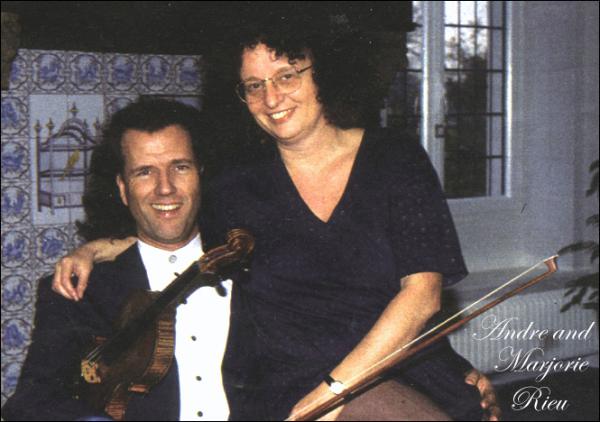In 1995, a photo of André Rieu and his family was published in a Dutch magazine. That image, now over a decade old, remains one of the very few publicly available pictures of Marjorie, André’s wife. Since then, she has chosen to stay away from public attention, and out of respect for her wishes, no unofficial or intrusive images will be shared here. Only the older photographs taken specifically for their book and promotional purposes are shown, preserving her privacy and dignity.
In one of those images, André appears beside Marjorie, radiating the same charm he brings to the stage. The caption on the photo reads that unlike the solemn expressions often seen in classical concerts, André performs each waltz with a wide smile, aiming to make the entire world waltz along with him. He enjoys dancing too, although, as he once shared, the first waltz he danced with Marjorie nearly turned into a story of separation rather than romance.
André’s family is deeply rooted in music. His brother Robert Rieu lives in Marseille, France, where he reportedly plays cello in a local orchestra. In a family photo taken in 2004, André stands proudly with Robert and their other brother, Pierre.
Another sibling, Jean-Philippe, collaborated closely with André between 2001 and 2004. Together, they composed several beautiful pieces, including “Lost Heroes” and “Please, don’t go,” the latter featuring lyrics written by Marjorie. After parting ways professionally, Jean-Philippe continued his creative path, composing and producing music independently. His most recent release is titled “Azur.” He maintains a website and was also active on MySpace for a time. Though their professional paths diverged, recent news suggests that André and Jean-Philippe have come together once more to create new music.
Their older sister, Teresia Rieu, is a talented harpist who has appeared on several recordings still available online. She taught harp at conservatories in Maastricht, Arnhem, and Rotterdam, and mentored notable students such as Manja Smits, Ellen Versney, Bianca Tabois, and Manou Liebert, who went on to form a harp duo.
The youngest sister, Gaby Buirma-Rieu, is ten years younger than André. She lives in Limburg with her husband Bert and their five children, now in their teenage and young adult years. Unlike André, Gaby and her husband have maintained a strong commitment to their Catholic faith, often speaking publicly about raising children with religious values. Their daily life includes shared morning prayers, attending church even when traveling abroad, and leaving everything in the hands of God. For Gaby, her faith is at the center of everything. She describes André as a deeply loving and warm-hearted brother.
Information about their older sister Cillia has been difficult to find, and their mother has also chosen a quiet life. However, there are reports—though unconfirmed—that she still rides her bicycle through the streets of Maastricht. Considering her age, likely in her eighties, it’s a charming image that speaks to the enduring energy of Dutch women. She must feel immense pride in the son she handed a violin to when he was just five years old, and in the legacy he has since created by bringing the joy of the waltz to audiences around the world.
André’s older son, Marc Rieu, has also found his own artistic path. Known for his romantic spirit and vast musical knowledge, Marc is a painter. I’ve had the pleasure of meeting him on a few occasions and found him to be genuinely kind and humble. I even own one of his paintings, which I cherish deeply.
This family, filled with musicians, artists, and devoted individuals, reflects not only talent but also a deep sense of connection, creativity, and warmth—a fitting backdrop to the man who continues to make the world waltz.
